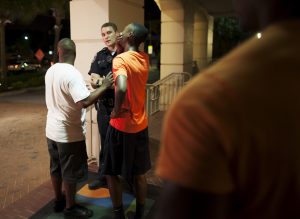(ThyBlackMan.com) In Los Angeles, an LAPD officer makes like a young Mike Tyson and wails away on full video on a non-resisting, compliant homeless man. In Minneapolis, the world is shocked by the video of former Minneapolis copy Derek Chauvin choking the life out of a non-resistant, compliant George Floyd. In Buffalo, New York, an officer kicks and beats a non-resistant, compliant, suspect.
In each case, other officers on the scene either stood by and did nothing or, as in Minneapolis, piled on a near lifeless Floyd. in Buffalo, it got even worse. One officer repelled by the kicking and beating of the suspect intervened. She was then assaulted by the thug officer, terminated, and her pension contested by the department. These three recent horror stories sparked mass protests. But this stuff is so common and routine among cops that it’s canonized as the code of blue silence.
Now what if cops not only knew that they’d be prosecuted for wanton acts of violence against unarmed young Blacks and Hispanics, but they’d also be fingered for potential prosecution if they stood around and did nothing or worse joined in the abuse? This would be a major game changer in rooting out abusive cops. The problem is most big city police departments do not have any written, or enforced, policy requiring officers to intervene and report other officers who commit misconduct. That includes the LAPD.
How diligent the departments that do have a facsimile of such a policy enforce it is another matter. Legislators in Michigan now propose legislation that formally requires any officer who witnesses excessive force by another officer has a duty to intervene. Most police officials in the state predictably have been stone silent on the legislation. The LAPD should follow Michigan’s lead on this.
We hammer murderous cops who commit blatant abusive acts up to and including the slaying of unarmed citizens. But they couldn’t exist in any department without the wink and nod, blind eye, and look the other way of officers within these departments and more than a few administrators.
Chauvin is a near textbook example of this. He had a hideous record of assaults, dubious shootings, endangering car chases, and a stack of abuse complaints against him as well as department and county prosecutor investigations. It would stretch belief to think that other officers who worked with him didn’t know about his record and his dubious policing. Yet, not one stepped forward to blow the whistle on him. This is so routine that it would have been a shock if one officer had broken ranks and screamed foul.
Here’s how deep, prevalent, and terrifying the blue code of silence is in police culture. The National Institute of Ethics in a study commissioned by the International Association of Police Chiefs in 2016 surveyed hundreds of cops in 21 states. They found that nearly 80 percent of cops said that a code of silence exists, more than half said it didn’t bother them, almost half admitted that the code was strongest when excessive force was used, and half also admitted they had witnessed misconduct by another officer but kept their mouths shut about it.
Why? Because in many cases they were told to keep quiet by other officers and in even more cases by department higher-ups. And if they didn’t they were scared stiff that they would be ostracized; the officer who committed the misconduct would be disciplined or fired; or worse, they’d be fired, or at the very least would be “blackballed,” or that their bosses would simply blow their complaint off. A significant number of them said they wanted to speak out about the abusive acts of fellow officers but were pressured by “uninvolved officers” to keep quiet.
However, there’s not or never has been any need for them to quake at that prospect. Courts have sided with officers in the few times that they have broken ranks and called out other officers to higher-ups for misconduct from beatings to the shooting of suspects or civilians. In one case an appeals court in California went further and reminded police officers and officials in a ruling on the issue that it’s the legal and professional duty of an officer to report misconduct by another officer. It’s a protected constitutional right and that any form of retaliation against the officer for speaking out is illegal.
The problem is that few police departments pound this point home to rank and file officers or for that matter to their superiors. Put bluntly, telling them, and continuing to tell recruits at the academy, officers in orientation and training sessions, and in their performance evaluations that the department has zero tolerance toward police misconduct. That if an officer witnesses it, they are duty-bound to report it. If they don’t, they are just as guilty of law breaking as the cop that breaks the law. The blue code of silence makes it possible for bad cops and bad administrators to get away and keep getting away with abusive acts. When cops due their duty and intervene and administrators back them up this will be a giant step toward riding departments of the Chauvin’s.
Written By Earl Ofari Hutchinson
One can find more info about Mr. Hutchinson over at the following site; TheHutchinson Report.
Also feel free to connect with him through twitter; http://twitter.com/earlhutchins
He is also an associate editor of New America Media. His forthcoming book is From King to Obama: Witness to a Turbulent History (Middle Passage Press).

















Leave a Reply